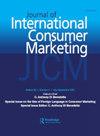Does the Use of Foreign Languages in Different Types of Products Lead to Different Consumer Perception?
IF 2.8
Q3 BUSINESS
引用次数: 4
Abstract
Abstract The language used in brand names and product labels has various effects on consumer perceptions. A language that is spoken all over the world such as English is one of the most widely spoken and used languages in advertising. Another view regarding the use of foreign languages is that consumers spend more effort mentally because they attract more attention than their language and thus the memorability of the products is higher. Consumers' perception of the language used in brand names and product labels may not be the same for all products. Since the motivation of consumers to buy these products will be different, it can be expected that the effects of the language used will be different. In this study, a scenario-based experiment is utilized by manipulating brand name, product label, and product type. According to the results, there is a significant two-way interaction effect of brand name and product label; consumers' product evaluation and purchase intention are higher for foreign brand names (vs. local) and Turkish–English product labels (vs. just in Turkish). Although not hypothesized, there is also a three-way interaction among brand name, product label, and product type.在不同类型的产品中使用外语是否会导致不同的消费者感知?
品牌名称和产品标签中使用的语言对消费者的认知有各种影响。一种世界通用的语言,如英语,是广告中使用最广泛的语言之一。另一种关于使用外语的观点是,消费者在心理上花费更多的精力,因为他们比他们的语言更能吸引注意力,因此产品的可记忆性更高。消费者对品牌名称和产品标签中使用的语言的感知可能对所有产品都不一样。由于消费者购买这些产品的动机会有所不同,因此可以预期,所使用的语言效果也会有所不同。在本研究中,通过操纵品牌名称、产品标签和产品类型,利用基于场景的实验。结果表明,品牌名称与产品标签存在显著的双向交互效应;消费者对外国品牌名称(相对于本地)和土耳其-英语产品标签(相对于仅使用土耳其语)的产品评价和购买意愿更高。虽然没有假设,但品牌名称、产品标签和产品类型之间也存在三向交互作用。
本文章由计算机程序翻译,如有差异,请以英文原文为准。
求助全文
约1分钟内获得全文
求助全文
来源期刊
CiteScore
7.60
自引率
6.10%
发文量
29
期刊介绍:
The Journal of International Consumer Marketing examines consumer and organizational buyer behavior on a cross-cultural/national and global scale combining up-to-date research with practical applications to help you develop an action plan for successful marketing strategy development. Business professionals, policymakers, and academics share insights and "inside" information on a wide range of cross-cultural marketing issues, including international business customs, negotiating styles, consumer brand loyalty, price sensitivity, purchasing and leasing, consumer satisfaction (and dissatisfaction), and advertising.

 求助内容:
求助内容: 应助结果提醒方式:
应助结果提醒方式:


